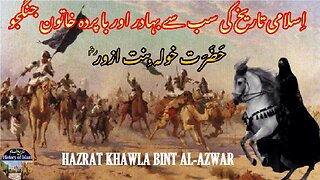Premium Only Content

Quranic Story The Revolt of the Children of Israel قرآنی کہانی بنی اسرائیل کی بغاوت
@islamichistory813 #historyofisrael #black #hebrew #israelite #rebellion #israelite #sejarah #palestina #dan #israel #palestina #dan #israel #slave #animated #history #jews #sejarah #israel #dan #palestina #christians #israel #animated #historical #documentary #inspirational #stories #revolutions #pharaoh #egypt #israel #palestina #perang #faith #stories #esther #dhanraj #history #lesson
Quranic story: The Rebellion of the Israelites
Brothers, sisters, friends and elders, Assalamu Alaikum Wa Rahmatullahi Wa Barakatuh.
We welcome you to the Islamic informative series episode No 21 on healing and events from the Holly Quran, in this video we will describe, Quranic story: The Rebellion of the Israelites
The story of Prophet Musa (AS) and the Israelites, particularly their rebellion through the worship of the golden calf, is one of the most significant and tragic chapters in the history of the Children of Israel. Despite the countless miracles they witnessed and the continuous guidance of their Prophet Musa, the Israelites ultimately fell into ingratitude and disobedience. This event, which took place after their miraculous escape from the oppressive rule of Pharaoh, serves as a powerful reminder of human tendencies toward doubt and rebellion, even when divine signs are clear and overwhelming. The Israelites’ worship of the golden calf symbolizes a deep spiritual failure, revealing the weakness of their faith and the ease with which they reverted to idolatry.
Prophet Musa (AS) was sent by Allah to free the Israelites from the tyranny of Pharaoh, who had enslaved them for many years. Through a series of extraordinary miracles, Prophet Musa showed the Israelites the undeniable power of Allah. He first confronted Pharaoh, demanding the release of the Israelites. Pharaoh, in his arrogance, rejected the demand and challenged the authority of Musa, leading to a series of divine plagues sent by Allah upon the Egyptians. These plagues were severe and destructive, including locusts, frogs, blood, and other calamities. Despite these clear signs, Pharaoh remained obstinate and continued to oppress the Israelites. Eventually, by Allah’s command, Prophet Musa led the Israelites out of Egypt, and as they fled, Allah parted the Red Sea, allowing them to escape, and drowned Pharaoh’s army as they pursued them. This miraculous event alone was a clear testament to the power of Allah and the leadership of Prophet Musa.
However, even after witnessing these miraculous events, the Israelites’ faith remained fragile, and their gratitude was short-lived. After crossing the Red Sea and escaping the oppression of Pharaoh, they found themselves in the desert, where they continued to receive divine sustenance from Allah. Manna and quail were sent down to provide food for them, and when they were thirsty, water gushed from a rock at Prophet Musa’s command. Despite these continuous blessings, the Israelites soon grew impatient and dissatisfied. They questioned Prophet Musa’s leadership and began to grumble about their situation in the desert. The harshness of the desert life, the lack of stability, and the uncertainty of their future began to erode their faith in Allah’s plan for them.
In the meantime, Prophet Musa (AS) was called by Allah to ascend Mount Sinai, where he would receive the commandments—written on stone tablets—that would guide the Israelites on how to live righteous lives in accordance with Allah’s will. He left his people temporarily to receive these divine instructions. However, during his absence, a group of the Israelites, led by a man named Samiri, fell into a grave error that would have lasting consequences. They grew restless, and in their impatience and doubt, they demanded that an idol be created for them to worship. The Israelites, despite their recent miraculous deliverance from Pharaoh, fell back on old ways of idolatry, which had been ingrained in them during their time in Egypt.
Under the leadership of Saamiri, a golden calf was created using the jewelry and ornaments that the Israelites had collected from the Egyptians. Samiri had crafted the calf by melting down the gold, and when the people saw the golden calf, they were overcome with excitement and began to worship it. They said, “This is our god, and the god of Musa, but he has forgotten it.” This statement was a direct rejection of the true oneness of Allah and the leadership of Prophet Musa. They chose to worship the golden calf, a lifeless object, rather than the Creator of the heavens and the earth who had shown them so many signs.
Prophet Musa (AS), upon descending from the mountain, was confronted with this shocking scene. He had left his people in a state of faith and obedience to Allah, yet upon his return, he found them in utter rebellion, worshipping a golden calf. His heart was filled with anger and grief, and he immediately called the people to account. He questioned them about their actions, reminding them of the miracles they had witnessed and how Allah had delivered them from Pharaoh’s tyranny. Musa’s reaction was one of intense disappointment. He had hoped that his people would be steadfast in their faith, yet they had reverted to their old ways of disbelief and idolatry.
In the Qur’an, Allah narrates this incident in Surah Al-A’raf, verses 51–55, where He highlights the grave nature of the Israelites’ sin. In verse 51, Allah states, “And [recall] when We took your covenant and raised over you the mount, saying, ‘Take what We have given you with determination and listen.’ They said, ‘We hear and disobey.’” This verse refers to the covenant that Allah had made with the Israelites, where they promised to follow His guidance and obey His commandments. However, despite the clear terms of the covenant and the immense blessings they had received, they chose to disobey.
Verse 52 further emphasizes their ingratitude: “And if We had decreed upon them, 'Kill yourselves,' they would not have done it, except for a few of them.” This statement underlines the Israelites’ lack of commitment to their faith. They had witnessed the power of Allah in the parting of the Red Sea, the provision of food from heaven, and the water that gushed from a rock, yet their hearts were still unfaithful. The moment Musa (AS) was absent, they quickly abandoned the worship of the One true God and fell into idolatry.
The consequences of their actions were severe. Prophet Musa, upon witnessing their disobedience, was forced to confront Samiri, the instigator of the calf worship. Samiri admitted his role in the creation of the idol, but his excuse was feeble and unconvincing. Prophet Musa ordered that the golden calf be destroyed and that the people repent for their sin. As for Samiri, he was condemned, and it was decreed that he would live in isolation, a punishment that highlighted the severity of his rebellion. The punishment for the idolaters was that they would have to repent by purifying themselves through sacrifice.
In verse 55 of Surah Al-A’raf, Allah says, “Then We forgave you after that so perhaps you would be grateful.” Despite the severity of their sin, Allah showed mercy to the Israelites. They were given the chance to repent and return to the right path. Allah’s forgiveness was granted to those who sought it sincerely, offering them the opportunity to correct their wrongs and once again worship Allah alone. This moment of forgiveness, however, also served as a reminder of the fragility of human nature and the need for constant vigilance in faith and gratitude.
The story of the rebellion of the Israelites and the worship of the golden calf teaches profound lessons about human nature, faith, and the consequences of disobedience. It highlights the tendency of people to revert to old habits, even after being shown the most miraculous signs. It also emphasizes the importance of remaining steadfast in faith, trusting in Allah’s plan, and being grateful for the blessings we receive. The Israelites’ failure to uphold their covenant with Allah serves as a cautionary tale for all believers, reminding them of the dangers of impatience, ingratitude, and disobedience.
Prophet Musa’s confrontation with the Israelites underscores the importance of strong leadership and the responsibility of leaders to guide their people in the right direction. His reaction to their disobedience was one of deep sorrow, but it was also a call to repentance and renewal of their commitment to Allah. The story ultimately demonstrates the boundless mercy of Allah, who, despite the people’s grave error, gave them the chance to repent and return to Him. It is a powerful reminder that no matter how far we stray, Allah’s forgiveness is always within reach, as long as we turn to Him in sincere repentance.
With this, we seek your permission until tomorrow and pray to Allah Almighty to grant us the ability to follow the injunctions of the Quran and the Prophetic Hadith, Amen
Allah Hafiz.
=========================
-
 17:05
17:05
ISLAMIC HISTORY
3 days agoKhawla bint al-Azwar | The Veiled Warrior of Islam | خولہ بنت الازوار |اسلام کی باپردہ جنگجو
1 -
 2:14:18
2:14:18
The Pascal Show
13 hours ago $0.40 earnedTHEY LIED TO POLICE AGAIN? Jake & Rebecca Haro Have Lost Their Minds! Emmanuel Haro Search Continues
8.48K -
 1:25:52
1:25:52
TruthStream with Joe and Scott
2 days agoSG Sits Down w/ LT From "And We Know": An 80K FT View of Humanity's Great Awakening from 8/22/2025
15.8K16 -
 15:54
15:54
Lacey Mae ASMR
12 hours ago $0.68 earnedASMR For Sleep in 15 Minutes!
13.1K10 -
 3:16:38
3:16:38
Price of Reason
12 hours agoTrump FIRES Fed Governor Lisa Cook! Cracker Barrel CRISIS Continues! James Gunn DCU Woes! Gamescon!
116K8 -
 2:25:01
2:25:01
FreshandFit
7 hours agoTyreek Hill Pays Ex Wife $1 Million in Ongoing Fees From Divorce?!
34K4 -
 2:03:46
2:03:46
Inverted World Live
9 hours agoHaunted Dolls Hack Amazon Alexa | Ep. 98
109K2 -
 3:09:53
3:09:53
Laura Loomer
9 hours agoEP140: Loomer EXPOSES Islamification At US State Department
37.4K12 -
 3:05:00
3:05:00
TimcastIRL
9 hours agoTrump Floats Accepting 600,000 Chinese Student Visas, MAGA Uproar | Timcast IRL
217K161 -
 8:44:47
8:44:47
SpartakusLIVE
15 hours ago$20,000 Hide and Seek Tourney w/ Stonemountain64 || #1 Rat wins the BIG CHEESE
71K